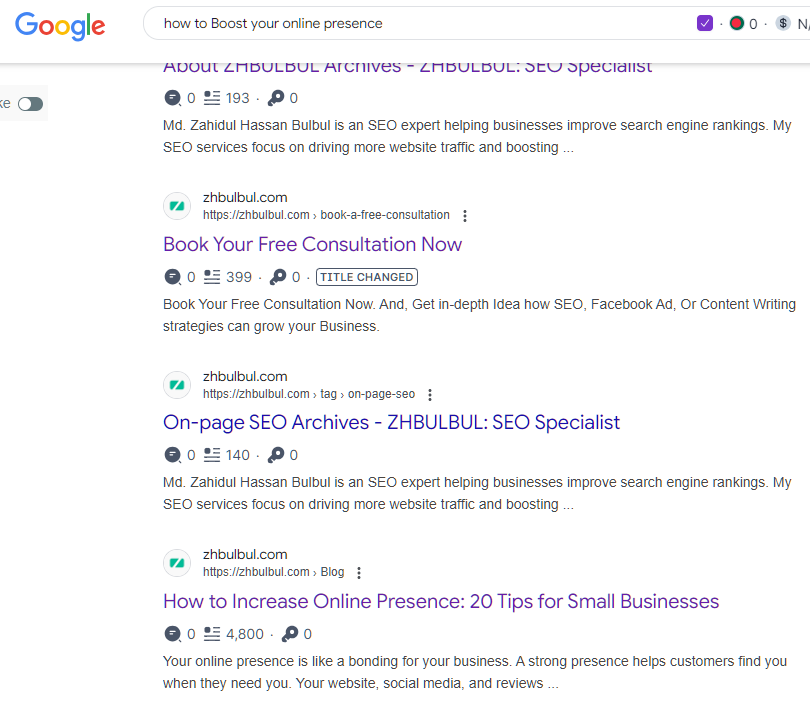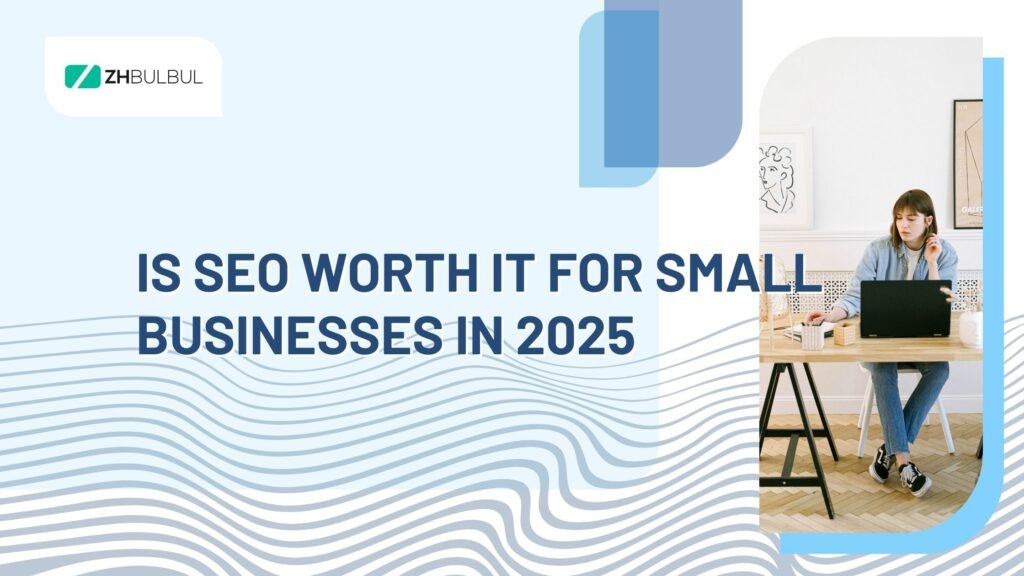In the rapidly evolving digital transformation, a million-dollar question arises for small businesses mind: Is SEO worth it for small businesses in 2025?
As we approach 2025, this query becomes increasingly pertinent. The digital realm continues to expand, and consumer behavior shifts more towards online platforms. In this context, SEO emerges as a critical factor for small business success.
SEO is the part of internet marketing that involves ways to maintain or secure your online visibility through organic customers.
From a small business owner’s standpoint, an affordable marketing strategy is highly preferred by small businesses that can still deliver long-lasting returns and business growth.
The decision to invest in SEO, however, also requires careful consideration of many aspects, like target customers, the competitive online environment, and rapidly changing digital marketing strategy.
If we inquire about the crucial factors of investing in SEO for small businesses in 2025, we’ll explore its potential impact, challenges, and strategies for success.
This comprehensive guide aims to equip you with the knowledge to make an informed decision about incorporating SEO into your marketing arsenal.
The Evolving Landscape of SEO
The Search Engine Optimization strategy is changing rapidly every year. From the day it came into existence, the scene of search engine optimization (SEO) has grown.
Today, in the year when the calendar reminds us to turn to 2025, the SEO landscape continues to grow even more sophisticated. It is now performance-centered, user intention-focused, and it uses technology like artificial intelligence, and machine learning with NLP (Natural Language Processing).
Even Google’s algorithms now can identify user intent and context regarding the overall quality of content. Then as such, SEO is not anymore confined to key phrases and backlinks but rather about building a more well-rounded online existence intended to serve your audience at their very best.
For small businesses, these changes bring both challenges and opportunities. On the one hand, that might appear to be a more difficult case concerning competition against those bigger and older competitors.
On the other hand, it means that the quality and relevance will balance the level playing field for smaller businesses carving niches into the marketplace and attracting those customers through comprehensive SEO strategy implementation.
In 2025, SEO encompasses a wide range of elements, including:
- Content quality and relevance
- User experience and website performance
- Mobile Optimization
- Local SEO for brick-and-mortar businesses
- Voice search optimization
- AI and machine learning considerations
Understanding these components and how they interact is crucial for small businesses looking to leverage SEO effectively.
Is SEO Worth It for Small Businesses and SEO Benefits in 2025

Increased Online Visibility and Brand Awareness
In this super-fast digital era, consumers use search engines for everything from product research to local service providers.
Being visible online is no longer optional. it’s essential nowadays. When potential customers are actively looking for products or services, your SEO strategy can help small businesses appear in search results.
This increased search engine visibility not only drives traffic to your website but also builds brand awareness and credibility.
Consider this: A local bakery optimizing for terms like “best artisanal bread in [city name]” or “gluten-free pastries near me” can attract customers who are specifically looking for these offerings.
By appearing in these search results, the bakery increases its chances of being discovered by new customers and establishes itself as a go-to option in its niche.
Cost-Effective Marketing Strategy
SEO offers a cost-effective alternative to traditional advertising methods or paid methods for Small businesses that are operating on tight budgets.
Paid advertising can drive immediate results on search engine result pages. But, at the same time, it requires continuous investment to maintain visibility on search results.
SEO, on the other hand, focuses on organic growth, which can lead to sustainable, long-term results without the ongoing costs incurred by the paid ads.
Investing in SEO allows small businesses to:
- Attract qualified leads who are actively searching for their products or services
- Build a foundation for long-term online success
- Reduce reliance on paid advertising over time
- Maximize marketing ROI through targeted, organic traffic
Leveling the Playing Field
One of the most essential aspects of choosing SEO for small businesses is its high potential to create a level playing field with the larger competitors.
In this digital era, size doesn’t always rather what matters are relevance, quality, and user experience. A well-executed SEO strategy can help a small business outrank larger competitors for specific keywords or in local search results.
For instance, a boutique hotel focusing on eco-friendly accommodations could potentially outrank large hotel chains for searches related to “sustainable travel options” or “eco-friendly hotels in [location]” by creating high-quality, relevant content and optimizing their website for these specific terms.
Key SEO Strategies for Small Businesses in 2025
Local SEO: Dominating Your Geographic Area
Local SEO can be the best option for those small businesses that are operating in specific geographic locations or local areas.
In 2025, local search has become even more accurate and relevant for search engines considering factors like proximity, relevance, and prominence when delivering results.
To capitalize on this, small businesses should:
- Claim and optimize their Google Business Profile
- Ensure NAP (Name, Address, Phone number) consistency across all online platforms
- Encourage and manage customer reviews
- Create location-specific content and landing pages
- Optimize for “near me” and voice searches
By focusing on local SEO, small businesses can effectively compete in their immediate market, attracting customers who are looking for products or services in their area.
Content Marketing: The Cornerstone of SEO Success
Content remains king in the SEO world of 2025. However, the emphasis has shifted from quantity to quality, relevance, and user intent.
Small businesses should focus on creating content that:
- Addresses specific customer pain points and questions
- Provides genuine value and expertise
- Incorporates relevant keywords naturally
- Is optimized for featured snippets and voice search
- Includes a mix of formats (text, images, videos, infographics)
By consistently producing high-quality, relevant content, small businesses can establish themselves as authorities in their niche, improve their search rankings, and attract and retain customers.
Technical SEO: Ensuring a Solid Foundation
While content is crucial, technical SEO forms the foundation upon which your content strategy is built.
In 2025, technical SEO considerations for small businesses include:
- Website speed and performance optimization
- Mobile-first indexing compliance
- Secure (HTTPS) website
- Structured data implementation
- XML sitemaps and robots.txt optimization
- Core Web Vitals optimization
Ensuring your website is technically sound not only improves your search rankings but also enhances user experience, leading to higher engagement and conversion rates.
Measuring SEO Success for Small Businesses
To determine if SEO is worth the investment, small businesses need to track and measure their efforts.
Key metrics to monitor include:
- Organic traffic growth
- Keyword rankings for target terms
- Conversion rates from organic traffic
- Local pack appearances for relevant searches
- Backlink quality and quantity
- Page load times and other technical SEO metrics
By regularly analyzing these metrics, small businesses can assess the effectiveness of their SEO strategies and make data-driven decisions to improve their online presence.
Challenges and Considerations
SEO offers numerous benefits. At the same time, small businesses should be aware of some potential challenges:
- Time investment: SEO is a long-term strategy that requires consistent effort and patience.
- Continuous Search Engine algorithm updates: Search engine algorithms are constantly changing. It requires ongoing learning and adaptation to cope with the changes.
- Competition: Depending on your industry, you may face fierce competition for top rankings.
- Resource allocation: Balancing SEO efforts with other business priorities can be challenging for small teams or businesses.
Is SEO Worth It for Your Small Business in 2025?
The answer to whether SEO is worth it for your small business in 2025 largely depends on your specific circumstances, goals, and resources.
However, considering the increasing importance of online visibility and the cost-effectiveness of SEO compared to other marketing channels, it’s likely that investing in SEO will yield positive returns for most small businesses.
Is SEO the right strategy for your business? You have to understand the following questions deeply:
- Are your target customers using search engines to find products or services like your services and products?
- Do you have the essential resources (time, expert people, or budget) to invest in a long-term SEO strategy?
- Is your website not performing in search results compared to your competitors currently?
- Are you searching for a cost-effective solution to increase your online visibility and generate more customers?
If you answered yes to most of these questions, investing in SEO could be a game-changing decision for your small business in 2025.
Getting Started with SEO for Your Small Business
If you’ve decided that SEO is worth pursuing for your small business, here are some steps to get started:
- Conduct a detailed website SEO audit to identify your areas of improvement.
- Develop a content strategy that goes with your business goals. And consider your target audience’s demands.
- Properly optimize your Google Business Profile (GBP) and focus on local SEO. If you serve a specific geographic location, you must consider local SEO.
- Invest in learning SEO basics or consider partnering with an SEO professional or agency.
- Set realistic goals and KPIs to measure your SEO progress.
- Stay updated about SEO trends and algorithm updates to adapt your strategy as per requirement.
By taking these steps and committing to a long-term SEO strategy, your small business can harness the power of search engines to drive growth, increase visibility, and achieve sustainable success in the digital marketplace of 2025 and beyond. Please visit ZHBULBUL and Book Your Free Consultation Now!
Conclusion: Embracing SEO for Small Business Success
As we navigate the digital landscape of 2025, SEO remains a critical component of small business success. Its ability to increase online visibility, attract qualified leads, and level the playing field with larger competitors makes it an invaluable tool for growth and sustainability.
While SEO requires time, effort, and ongoing adaptation, the potential rewards—increased traffic, higher conversions, and long-term cost savings—make it a worthwhile investment for most small businesses.
By embracing SEO and implementing strategies tailored to your specific goals and audience, you can position your small business for success in the increasingly competitive online marketplace.
Remember, SEO is not a one-size-fits-all solution, nor is it a quick fix. It’s a long-term strategy. It can drive sustainable growth and a strong foundation for your online presence when SEO is executed properly.
As we move further into 2025 and beyond, the businesses that utilize SEO strategy and adapt to the evolving digital transformation will be in the best position in their niche markets.
